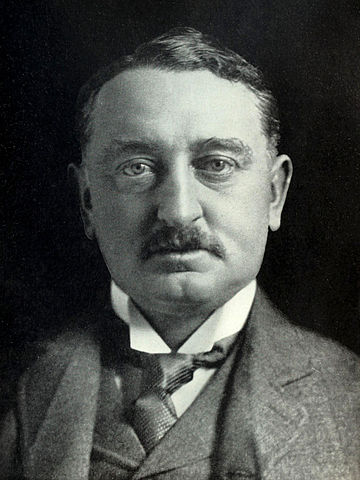
In God or the Guessers (1926), a copy of which (it will be recalled: part 1; part 2) I recently delightedly obtained, Leander Lycurgus Pickett quotes a whole, if brief, paragraph from Alexander Patterson’s The Other Side of Evolution (1903). Occurring in chapter 6 (“Evolution and the Bible”), in a subsection entitled “Evolution a Relic of Heathenism,” the paragraph reads, in its entirety:
Evolution is working towards a pantheistic atheism. This is expressed in the creed of the late Cecil Rhodes, the late magnate of South Africa, as follows: “I believe in Force Almighty, the ruler of the universe, working scientifically through natural selection to bring about the survival of the fittest and the elimination of the unfit.”
Rhodes (above), of course, was the energetic but unscrupulous mining entrepreneur and imperialist politician who died on March 26, 1902, shortly before The Other Side of Evolution was published. The term “creed” was chosen deliberately: the words attributed to Rhodes are reminiscent of traditional Christian creeds such as the Apostles’ Creed, which begins, “I believe in God, the Father almighty, creator of heaven and earth.”
Patterson, as far as I can tell, was the first person to attribute the creed to Rhodes. He wasn’t the last: E. B. Pollard, a Baptist pastor in Kentucky, offered a slightly different version—“I believe in Force Almighty, operating through natural law to the survival of the fittest and the destruction of the unfittest”—in a discussion of “Are Christian Principles a Hindrance to Financial Success?” in 1904, and Henry C. Mabie, a Baptist minister, offered yet a different version—“I believe in Force Almighty, the ruler of the universe, working scientifically, through natural selection, to bring about the survival of the fittest and the elimination of the unfittest”—at the Universal Exposition in St. Louis in 1904. As the memory of Rhodes receded from the popular consciousness, though, the creed was increasingly uncommon in the antievolutionist literature.
Unsurprisingly, there is no indication that Rhodes ever said or wrote those exact words. Nevertheless, it’s hard to accuse Patterson, Pollard, and Mabie of a serious misrepresentation. In The Last Will and Testament of Cecil John Rhodes—a book edited by Rhodes’s friend and admirer, the influential journalist W. T. Stead (1849–1912: he was on the Titanic when it sank)—there appears the following:
Mr. Rhodes, as I have said, is a Darwinian. He believes in the gospel of evolution, of the survival of the fittest, of progress by natural selection. … What is the distinctive feature of that doctrine [i.e., evolution]? The perfection of the species, attained by the elimination of the unfit; the favourable handicapping of the fit. The most capable species survives, the least capable goes to the wall. The perfecting of the fittest species among the animals, or of races among men, and then the conferring upon the perfected species or race the title-deeds of the future; that seemed to Mr. Rhodes, through his Darwinian spectacles, the way in which God is governing His world, has governed it, and will continue to govern it, as far as we can see the future.
On the evidence of the passage, Rhodes would have disavowed Patterson’s suggestion that he worshipped force instead of God, but he would have little cause for complaint otherwise. And the religiously inflected phrases of Stead’s description (“the gospel of evolution” and so forth) certainly would have encouraged the redescription of Rhodes’s view as a creed. It’s really just the quotation marks that are problematic.
So if you—like me—admire Darwin but not Rhodes, is the creed of Force Almighty embarrassing? Not especially. Darwin’s influence on Rhodes appears to have been mediated by the novelist and explorer Winwood Reade (1838–1875), the author of The Martyrdom of Man (1872), a controversial universal history of the world emphasizing (inter alia) the importance of Africa. According to Anthony Thomas’s biography Rhodes (1996), “Rhodes read the book shortly after publication and described it as ‘creepy’. He would also claim that ‘it made me what I am’.” A correspondent of Darwin’s, Reade purported to be following in his footsteps, but also acknowledged, “there is probably much in this work [The Martyrdom of Man] of which Mr. Darwin will disapprove. He must, therefore, not be made responsible for all the opinions of his disciple.”
More importantly, despite Rhodes’s occasional invocations of Darwin and Reade, a review of his career hardly supports the idea that his actions were influenced by his acceptance of their views. As the historian David Paul Crook summarized the matter in “Historical Monkey Business” (1999, reprinted in his Darwin’s Coat-Tails [2007]):
Sustained Darwinian speculation was rarely used in “serious” justifications of new empire. “Darwinian” themes were used primarily as slogans, simplistic propaganda, crude theatre, cultural extravaganza. When advocates of empire got down to the nub of the matter and gave extended rationales for expansionism, the main thrust of their arguments was economic, geo-political, strategic, and conventionally nationalistic.
Despite Stead’s description, it is hard to believe that Rhodes saw the world through Darwinian spectacles. Rather, he wanted the world to see him as a man of principle, guided by the thought of such luminaries as Marcus Aurelius and John Ruskin and Charles Darwin—and not by ambition and avarice.

